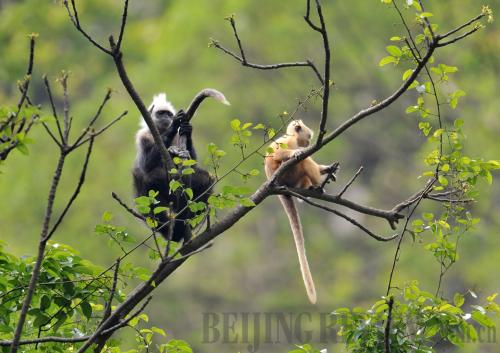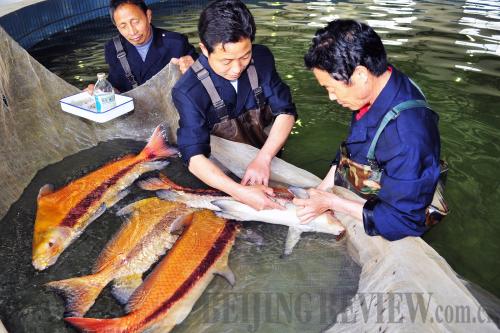|
 |
 |
|
GROWING: Two white-headed langurs in Guangxi Chongzuo Ecological Park (ZHOU HUA) |
PROTECTING FISH: Workers in a nature reserve in Yichang City, Hubei Province, treat injured Chinese suckerfish, a rare species living in the Yangtze River (HUANG XIANG) |
 |
 |
|
RIGHT OF WAY: Elephants saunter across a highway through Xishuangbanna Nature Reserve in Yunnan Province (LI YUNSHENG) |
CLOSE CONTACT: Snub-nosed monkeys in Shennongjia Nature Reserve in Hubei Province (PI SHUCHU) |
A delicate balance
As China needs a tremendous amount of resources to fuel its fast-growing economy, striking a good balance between ecological conservation and economic development is a tough job.
China had designated about 14.9 percent of its total land area as nature reserves at the end of 2010, said the Report on the Status of China's Environment released on June 3 by the Ministry of Environmental Protection. The report said there were 2,588 nature reserves on China's mainland, including 319 national-level ones.
The existing regulations on the management of nature reserves, promulgated in 1994, divide a nature reserve into three parts: core zone, buffer zone and experimental zone. Production activities are banned in core and buffer zones. In the experimental zone, only very few eco-friendly production activities are allowed.
The core zone is a well-preserved natural habitat and the gathering places of rare and endangered species. The regulations ban any organization or individual from entering the core zone, except for necessary scientific research activities approved by the State Council in national-level nature reserves and those approved by provincial governments in local-level reserves.
Only scientific research and monitoring are permitted in the buffer zone, while in the experimental zone, scientific experiments, educational programs, tourist activities, and breeding and taming of rare and engendered species are allowed.
As most production activities in nature reserves are prohibited, the State Administration of Environmental Protection, predecessor of the Ministry of Environmental Protection, issued a notice in 1999 saying the boundaries of nature reserves and their functional zones can be redrawn to make way for key government-approved transportation, water conservancy and hydropower projects that must pass through nature reserves, even their core and buffer zones.
"In recent years, development and construction activities involving nature reserves have increased by a big margin as the speed of industrialization and urbanization picks up," said Li Ganjie, Vice Minister of Environmental Protection.
Unrestrained development and construction activities have weakened the effectiveness of nature reserves and lowered their value. Li said about 22 percent of nature reserves in China had been damaged by such activities.
Many large projects such as highways and hydropower stations in nature reserves have been justified by adjustments to boundaries of nature reserves and their functional zones.
In 2010, the government agreed to redraw the boundaries of the Hekou Shuangtai Nature Reserve in Panjin City, Liaoning Province in northeast China.
"After the boundary adjustment, a natural habitat of seals is no longer included in the nature reserve's core area," said Tian Jiguang, head of a local volunteer organization dedicated to protecting seals.
A report jointly released in 2010 by the Nanjing Institute of Environmental Science, the Ministry of Environmental Protection and Nanjing Normal University said the boundaries of more than 40 national-level nature reserves or their functional zones had been redrawn.
Root of the problem
Some local governments put economic interests ahead of environmental protection, causing difficulties in protecting nature reserves against encroaching economic development, Fan said.
"Many provinces want to reduce the size of nature reserves and re-divide the reserves' functional zones," said Xue Dayuan, a researcher with the Nanjing Institute of Environmental Sciences.
He said when a coal mine was found in a nature reserve in a northwestern province, the local government immediately applied to the Ministry of Environmental Protection to trim the reserve's core zone.
"The government compensates local people for the economic loss incurred by strict conservation measures, yet the compensation mechanism in general is imperfect," said Yang Xuheng, an official responsible for wildlife protection in the Sichuan Provincial Forestry Department. "Local people still have a strong urge for making money from exploiting local natural resources, which is difficult to contain."
In face of mounting development needs, nature reserve authorities are often in an awkward situation, as they are locally governed.
Besides, nature reserve administrative organizations are inadequately financed and staffed.
In the three provinces and the municipality covered by the National Nature Reserve for Rare and Endangered Fish on the Upper Reaches of the Yangtze River, nature reserve authorities have been set up at provincial, county and district levels. But except for those in two counties, nature reserve authorities are all included in local fishery bureaus, and they have no separate staff or budget, Xinhua News Agency reported.
| 